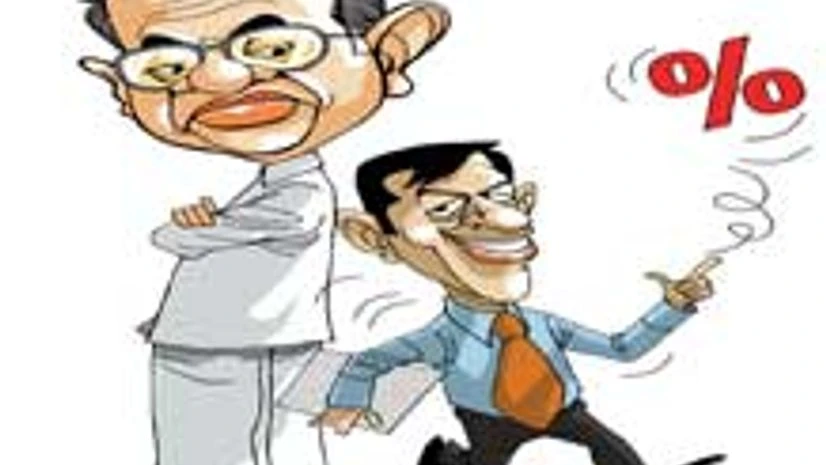Call it mere circumstance or deft handling by the new guard at the Reserve Bank of India (RBI), the Union finance ministry here no longer seems to perceive the central bank as drifting away from the goals set by North Block.
At least, it does not show displeasure with the central bank publicly, a contrast to D Subbarao's tenure as RBI chief.
New RBI Governor Raghuram Rajan raised the repo rate in his mid-quarter monetary review last month and Finance Minister P Chidambaram remained quiet. He might even support another rise this month, possibly for two reasons - a change in the ministry's focus from growth to the financing of the current account deficit, and the stature of Rajan.
Also Read
"After the US Federal Reserve in May announced it would start tapering its stimulus, the priority has shifted from growth to stable foreign inflows," said a ministry official, adding RBI and the government are now very much on the same page.
The finance ministry, however, cannot ignore growth, which fell to a decadal-low of five cent in 2012-13 and is expected to be in the same range this year. Earlier this month, Rajan met Chidambaram and the two decided more capital was needed to be provided to banks for lending to the automobiles and consumer durables sectors. The central bank complemented this by reducing the Marginal Standing Facility rate, at which it provides overnight funding to banks, by 50 basis points. It will also provide additional liquidity through term repos of a seven-day and 14-day tenor.
The ministry's silence on RBI's rate increase could not, though, be entirely attributed to a change in the economic situation. Officials said Rajan is a man of international repute and if the government criticises his moves, it would not go down well with markets and investors.
The rupee was hitting a new low every other day in August. It began strengthening soon after Rajan took charge as RBI governor on September 4.
The ministry is also expecting a more cordial relationship with Rajan on other issues such as setting up of a Debt Management Office (DMO) in the ministry. While Subbarao had made his opposition on this issue very clear, Rajan is not likely to oppose it.
Another official said Rajan favoured the idea when he was chief economic advisor in the ministry. He, however, added the central bank was fundamentally opposed to shifting the DMO to the ministry and the new governor's views would not reflect the opinion of the entire institution. There have been instances of bureaucrats who have moved from the finance ministry to RBI opposing their own earlier stand.
When Chidambaram returned to the ministry from another corner in North Block, the home ministry, only a little over a year was left of Subbarao's extended five-year tenure. The minister showed his disappointment with Subbarao's monetary stance after the former had already announced a five-year fiscal consolidation schedule.
Rajan is still in the honeymoon period. Criticising the governor from the beginning itself would take the sting out of the criticism, analysts said. More, taking on Rajan is not the same as opposing Subbarao's policy, since the former is renowned the world over for his commentaries on the financial world.
The rift between the ministry's fiscal policy and RBI's monetary stance is yet to come to the fore. The ministry has been saying it would rein in the fiscal deficit at 4.8 per cent of gross domestic product in 2013-14, despite the first five months having reached 75 per cent of that target limit. It will come out in the open if the ministry cannot succeed because of widening subsidies and expected shortfall in revenue. How deftly Rajan will handle that situation is yet to be seen.

)
